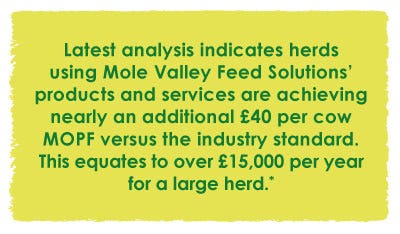
Feeding environmental change
Feeding environmental change


This is an industry leading approach and is part of our commitment to helping farmers and the farming industry through our Climate Positive Agriculture initiative.
The dairy sector is moving fast. Many milk purchasers are now looking at providing extra payments for achieving environment related targets. This is good news for farmers and the industry. As the leading British farmer cooperative, Mole Valley Feed Solutions is committed to helping farmers successfully navigate the new world.
In addition to our new commitment to labelling, we have also launched a new range of Climate Postive feeds, which have been specifically formulated with a low carbon footprint value. They exclude soy and palm-based feed materials and include a maximum carbon footprint value as an integral part of the specification.
Challenge us to help you reduce your carbon footprint
Areas to consider when looking to reduce environmental impact and improve margin over purchased feed (MOPF) include:
- The challenge of feeding low or high protein grass silage
- Why feed an 18% compound?
- Estimates of methane and nitrogen animal outputs from specific diets
- The importance of using an actual and not theoretical feed carbon footprint value in a farm’s carbon footprint calculation
- Improving milk fat and protein content
- Understanding how to maximise margin over purchased feed (MOPF) and reduce carbon footprint
- How to mitigate the high cost of high protein feeds.


*Source: Kingshay (year ending March 2021.)
For further information, please contact the Feed and Nutritionists Line on 01278 444829.









